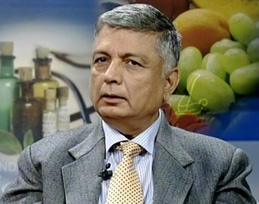Effect Of Diabetes In Kidneys
Hi,
I am Dr. Ashok Sarin, Nephrologist. Today I will talk about diabetes mellitus and how it affects the kidney. It is very common in India and North India. This is the disease which affects the kidney in many ways. The most common condition is the development of a urinary condition. And we also see when sugars are high, the patient can develop urinary tract infection. The other condition which is not very common is papillary necrosis in women where it gets large in the urethra, it forms stone and it can also cause bleeding in urine and other events. Then there is another microalbuminuria which a patient would not be able to appreciate but there are small amounts of protein are excreted by the kidney which they should not be and if we catch the condition early and treat it adequately then the microalbuminuria is reversible and it will prevent further damage to the kidney. After this condition knows as macroalbuminuria where a large number of proteins are excreted via the urine and this result in the fall of the protein concentration within the vascular or the blood compartment where there is puffiness of the face, swelling of the legs, feet and sometimes the in the abdomen as well. Then we have renal failure where the serum creatinine and the blood urea starts growing up gradually.
I will talk about the prevention of kidney disease by diabetes. And the important thing is that who has type 1 diabetes or juvenile diabetes where it starts in the teen and young adults where there is no fall in the patient and it is a genetic and hereditary condition where insulin required where of course renal damage or failure is not a fault of the patient. But type 2 diabetes which actually due to an environment where the patient has been eating too much or eating the wrong food, junk food, saturated fat, a lot of sweets and put on a lot of weight. This is highly avoidable. Because if this patient eats the right food low and saturated fats, low in carbs and indulges in regular exercise and make sure that the weight is down the, of course, diabetes is preventable and the blood sugar can be checked. Now it is very important if there is any indication of diabetes or the person is 40 years or above and if the weight is excessive, we must get a fasting and post fasting blood reports. Then HbA1c which gives us the report of blood sugar for over the last 3 months should be 6%. So, if these factors are maintained then the blood sugar is normal.
If these results are persistently high, the indicates patient is diabetic. And this person requires treatment. I told you about the importance of exercise, lifestyle change, eating pattern. Then smoking in diabetes is disastrous because in this combination patient will develop eye problem, heart disease, kidney disease and of course peripheral disease where the patient can develop gangrene of the toe and this can be a serious condition. We must do a lipid profile. Alcohol should be avoided or should be taken in moderation. The juvenile diabetic should always have a balanced diet and should indulge in exercise and also, take the insulin regularly. If all this is done then all the factors like smoking, alcohol is avoided then the ill effect of diabetics can be minimized to a great extent.
Thank You!


+1.svg)
